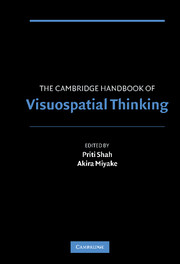Book contents
- The Cambridge Handbook of Visuospatial Thinking
- The Cambridge Handbook of Visuospatial Thinking
- Copyright page
- Contents
- List of Contributors
- Preface
- Acknowledgments
- 1 Functional Significance of Visuospatial Representations
- 2 Visuospatial Images
- 3 Disorders of Visuospatial WorkingMemory
- 4 Individual Differences in Spatial Abilities
- 5 Sex Differencesin Visuospatial Abilities
- 6 Development of Spatial Competence
- 7 Navigation
- 8 Mapping the Understanding of Understanding Maps
- 9 Spatial Situation Models
- 10 Design Applications of Visual Spatial Thinking
- 11 The Comprehension of Quantitative Information in Graphical Displays
- 12 Multimedia Learning: GuidingVisuospatial Thinking with Instructional Animation
- Author Index
- Subject Index
8 - Mapping the Understanding of Understanding Maps
Published online by Cambridge University Press: 05 June 2012
- The Cambridge Handbook of Visuospatial Thinking
- The Cambridge Handbook of Visuospatial Thinking
- Copyright page
- Contents
- List of Contributors
- Preface
- Acknowledgments
- 1 Functional Significance of Visuospatial Representations
- 2 Visuospatial Images
- 3 Disorders of Visuospatial WorkingMemory
- 4 Individual Differences in Spatial Abilities
- 5 Sex Differencesin Visuospatial Abilities
- 6 Development of Spatial Competence
- 7 Navigation
- 8 Mapping the Understanding of Understanding Maps
- 9 Spatial Situation Models
- 10 Design Applications of Visual Spatial Thinking
- 11 The Comprehension of Quantitative Information in Graphical Displays
- 12 Multimedia Learning: GuidingVisuospatial Thinking with Instructional Animation
- Author Index
- Subject Index
Summary
In some ways, maps are processed like any other visuospatial entity. However, because maps usually have a utilitarian function that results in comparison to an actual environment, processing of and memory for maps differs from that of other visuospatial forms. This chapter discusses comprehension and memory for maps, focusing on how perceptual information is understood conceptually. The cognitive map developed while learning a physical map has features similar to the actual environment, but also differs from it because of the cognitive processes used to form it. This chapter discusses those underlying processes and their effects on the resultant mental representation. Since the conceptual information takes the form of a mental or cognitive map, it is first important to understand some of the methodology used to study cognitive maps. This methodology allows for inferences about the nature and structure of cognitive maps and how they might be conceptualized. Further, the conceptualization of maps appears to be influenced by features of the individual, including cognitive goals, stage in development, and individual differences. These issues are discussed in the framework of conceptualizing map information.
Keywords
Information
- Type
- Chapter
- Information
- The Cambridge Handbook of Visuospatial Thinking , pp. 295 - 333Publisher: Cambridge University PressPrint publication year: 2005
Accessibility standard: Unknown
- 7
- Cited by
